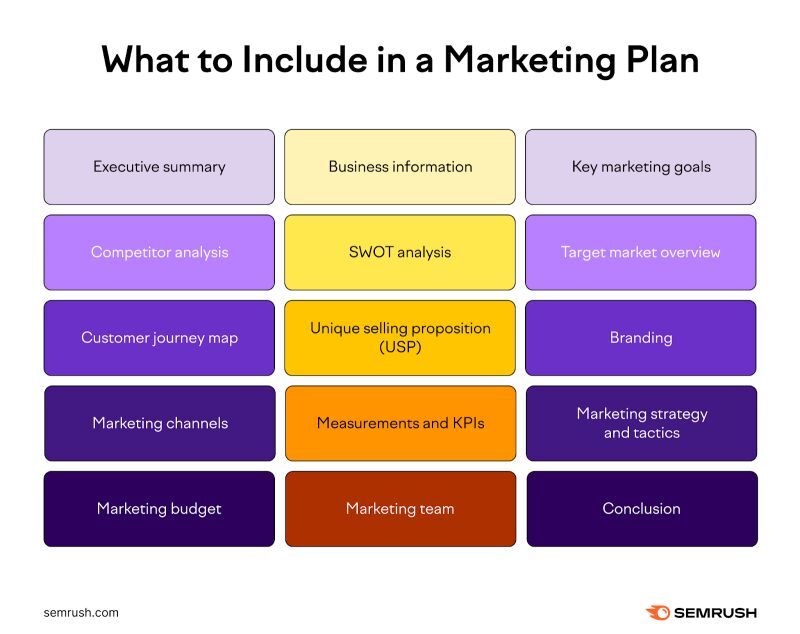What to Include in your Marketing Plan?
What to Include in your Marketing Plan?
In today’s business landscape, it’s vital to craft a comprehensive marketing plan to compete in the crowded market. A well-thought-out marketing plan serves as a roadmap, guiding your efforts and ensuring that your marketing activities are aligned with your business goals. Whether you’re a startup or an established company, here are key elements to include in your marketing plan:
- Executive Summary: Begin your executive summary by outlining key points such as objectives, target audience, main strategies, and expected outcomes.
- Set Clear Goals: Set SMART(Specific, Measurable, achievable, relevant, and time-bound) marketing goals aligned with your overall business objectives.
- Understand your audience: Define your target audience personas based on demographics, psychographics, behaviors, and their painpoints
- Analyze your competitors: Understand what your competitors are good at and where they’re lacking. This helps you find your edge and focus on what makes your business stand out.
- Define your Marketing Strategies and Tactics: Outline your overarching marketing strategies that suits to your business. It can be, content marketing, social media marketing, email marketing, SEO, paid advertising, etc.
- Plan Your Budget: Allocate a realistic budget for each marketing activity and channel. Make sure you’re spending your marketing money wisely where you can get high ROI.
- Identify key players: Decide who’s in charge of making your plan happen.
- Measure Your Performance: End your plan with how you’ll keep an eye on progress. Decide what you’ll measure, how you’ll do it, and how often.

A well-crafted marketing plan serves as a roadmap for achieving your business objectives and driving growth. By including these key elements in your marketing plan, you’ll be better equipped to navigate the ever-evolving marketing landscape and position your business for success.
A comprehensive marketing plan should include key elements to guide your marketing efforts effectively. Here’s a breakdown of what to include:
- Executive Summary
– Brief overview of your marketing goals and strategies.
– Concise summary of the entire marketing plan.
2. Mission Statement
– Define your company’s purpose and values.
– Align marketing goals with the overall mission.
3. SWOT Analysis
– Assess Strengths, Weaknesses, Opportunities, and Threats.
– Understand internal and external factors affecting your marketing.
4. Target Audience
– Clearly define your ideal customers.
– Identify demographics, interests, and pain points.
5. Marketing Goals
– Set specific, measurable, achievable, relevant, and time-bound (SMART) goals.
– Align goals with overall business objectives.
6. Marketing Strategies
– Outline the strategies you’ll use to achieve your goals.
– Include channels such as content marketing, social media, email, etc.
7. Budget and Resources
– Allocate funds for each marketing initiative.
– Specify human and technological resources needed.
8. Marketing Mix (4Ps)
– Product: Describe your products or services.
– Price: Set pricing strategies.
– Place: Determine distribution channels.
– Promotion: Outline promotional activities.
9. Timeline
– Create a timeline for implementing marketing strategies.
– Include milestones and deadlines.
10. Metrics and KPIs
– Define key performance indicators (KPIs) to measure success.
– Metrics may include website traffic, conversion rates, social media engagement, etc.
11. Monitoring and Adjusting
– Detail how you’ll monitor ongoing campaigns.
– Specify criteria for making adjustments based on performance.
12. Contingency Plans
– Anticipate potential challenges and risks.
– Develop contingency plans to address unforeseen issues.
13. Team Responsibilities
– Outline roles and responsibilities within the marketing team.
– Clarify who is responsible for each aspect of the plan.
14. Legal and Compliance
– Ensure all marketing activities comply with legal standards.
– Include considerations for data protection and privacy.
15. Conclusion
– Summarize the key points of the marketing plan.
– Reiterate overarching goals and strategies.
By incorporating these elements into your marketing plan, you create a comprehensive roadmap that guides your marketing efforts, ensures alignment with business objectives, and provides a framework for measurable success.
Hi Verginiya,
Obviously, Those 8 key points make the marketing realm more productive. we can take these points as milestones to achieve our main goal. Furthermore, If we plan based on this, we can avoid the obstacles in our roadmap which is path to the success in marketing field
Dear Verginiya,
Thanks for the impactful Marketing Plan Strategies, We can develop a thorough and data-driven marketing plan that helps to meet company goals and experience long-term growth in the competitive marketplace by following these steps and adding these essential elements we can achieve our business goals.



